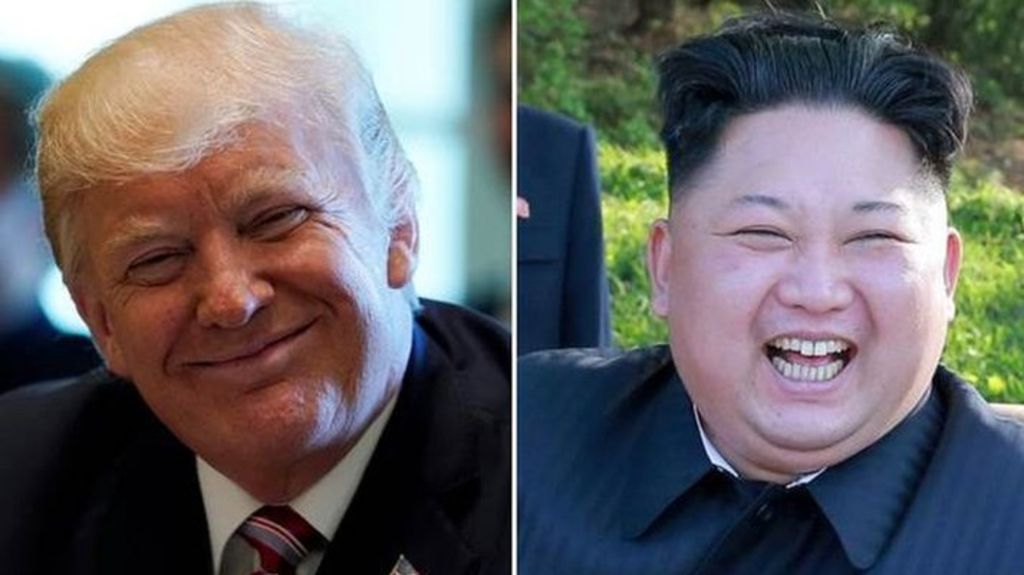—Could a war of words spiral into a war of nukes? That’s what some critics fear as President Trump and North Korean leader Kim Jong-un continue to insult each other with unusually harsh rhetorical slaps.
The “nuclear button” exchange was the latest such incident. On Monday, Mr. Kim said in his New Year’s speech that North Korea’s nuclear arsenal was now essentially complete and the launch button was “always on the desk in my office.” Mr. Trump replied in veiled personal terms, tweeting on Tuesday night that “I too have a Nuclear Button, but it is a much bigger & more powerful one than [Kim’s], and my Button works!”
Such words push the envelope on geopolitical discourse for the nuclear age. National leaders – particularly American presidents – typically speak with restraint about their atomic arsenals. That’s in recognition of the terrible destructive force the weapons embody.
Critics of Trump’s approach to taunting Kim say they are concerned that an injection of anger and emotionalism into the nuclear balance could be destabilizing.
But in this case it may be that structural factors such as the relative strength of conventional military forces and the geographical vulnerability of North and South Korea – all of which make the horrible price of conflict abundantly clear to both sides – are much more important than words.
Leaders matter in foreign policy, but only to a point, says Elizabeth N. Saunders, an associate professor of political science at George Washington University who studies that issue.
“Preemptive wars are very rare. Miscalculation is very rare. It doesn’t mean those things don’t happen. But again, we have to keep perspective,” says Dr. Saunders.
Reagan on radio
The degree to which US leaders speak softly about nukes can be seen in a previous exception to this tradition. In August 1984, then-President Ronald Reagan indulged in a bit of black humor while doing a sound check for his weekly radio program. “I have signed legislation to outlaw Russia forever,” he said into the microphone. “We begin bombing in five minutes.”CNN had tape of the incident, but the network’s president decided not to release it. Eventually word leaked out, with predictable reactions. US allies in Europe were aghast. “President’s Nuclear Joke Misfires” read the headline on Britain’s Evening Standard the next day. Soviet leaders professed outrage. The official USSR news agency TASS condemned what it called behavior “incompatible with the great responsibility borne by heads of nuclear states.”
The root of critical reaction perhaps lay in the contrast between the flippancy of Reagan’s words and the powerful consequences of nuclear weapons. Millions would have died in a 1980s superpower nuclear exchange. Similarly, today a nuclear explosion on the Korean peninsula would be an historic catastrophe.
That’s why US presidents have tended to speak obliquely about the US nuclear deterrent, referring to the “full force of American might,” for instance. Trump, however, has amped up this rhetoric, talking about the “fire and fury” of a possible US response to North Korean aggression. In that context, the personal nature of his jibes at “rocket man” Kim, and the comparison of button sizes, is but a step up the ladder of inflammatory phrases.
A leader's intent
“Normally, it would be shocking for the president of the United States to turn fighting a nuclear war into a punch-line, but under President Trump this is our new normal,” Jonathan Mercer, a University of Washington political science professor who specializes in international security and political psychology, says in an email.Nevertheless, critics wonder, will Kim believe that Trump’s words mean the US is increasingly likely to launch a preventive nuclear attack? If so, does he need to strike first rather than lose his small nuclear arsenal? Is the US in turn worried about such worries?
Or perhaps it is the US president who might become increasingly unstable if the taunting progresses, say other analysts.
“Spoken like a petulant ten year old. But one with nuclear weapons – for real – at his disposal,” tweeted Eliot A. Cohen, a professor at the Johns Hopkins School of Advanced International Studies and former State Department counselor, in response to Trump’s “button” tweet.
Trump himself seems to believe that his approach has proved its worth. On Thursday he took credit for North Korea’s offer to open talks with South Korea about possible participation in the upcoming Winter Olympics, and other issues. Trump tweeted that such an offer would not have occurred if he had not been “firm, and strong.”
Powerful constraints
But it is possible that both sides here are overstating the effect of tweets and rhetorical exchanges.The decisions of individual leaders can certainly increase (or decrease) the risk of conflict, says Saunders of George Washington. However, her research indicates that structural factors outside the personalities involved can matter more. And in this case, the structural factors may reduce the likelihood of war.
“These tweets are not happening in a vacuum. They are happening under powerful structural constraints that would have faced any US president,” she says.
Take geography. South Korea’s capital and largest city, Seoul, is so close to the border that North Korean artillery and short-range missiles could inflict massive damage in minutes under virtually any circumstances of conflict. That is a powerful incentive for the US, South Korea, and other regional allies to act with restraint against Pyongyang.
Both sides have formidable conventional military capabilities. Both know that any conflict will be protracted, difficult, and potentially catastrophic – for both sides.
These things do not mean it is impossible for a war spiral to take hold – look at the onset of World War I for an example. What they do mean is that there are lots of reasons why such a spiral might halt before shooting actually starts.

No comments:
Post a Comment